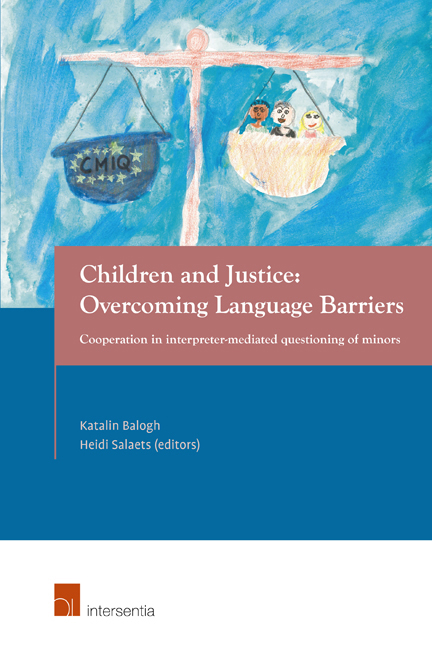 Children and Justice: Overcoming Language Barriers
Children and Justice: Overcoming Language Barriers Published online by Cambridge University Press: 22 November 2017
This book is the result of a research project entitled CO-Minor-IN/QUEST (JUST/201 l/JPEN/AG/2961), carried out under the supervision and with the support of the Criminal Justice Programme (DG Justice) of the European Union.
The project was developed in response to Directive 2012/29/EU establishing minimum standards on the rights, support and protection of victims of crime, and replacing Council Framework Decision 2001/220/JH. Within the group of victims, we decided to focus on a particularly vulnerable group: minors. Once the project started, it became clear that was not easy to completely set victims apart from other procedural categories in criminal proceedings (e.g. suspects and witnesses). A suspect may ultimately appear to be a victim, or a victim can be an important witness, or a witness can even become a suspect upon closer investigation. Along the way, it also became less self-evident to define vulnerability as a concept as such in an interview context involving minors. Children are vulnerable by definition and that is why it was particularly difficult to draw the line between vulnerability and extreme vulnerability. In this publication, however, we try to offer some suggestions on the subject without pretending this to be the absolute truth.
First, the project acronym requires some further explanation: cooperation in interpreter mediated questioning of minors. The meaning of the CO-prefix can be read in a double way. It first of all symbolises the cooperation between the members of the project's research consortium located in six Member States: Belgium, France, Hungary, Italy, the Netherlands and the United Kingdom (Scotland). Secondly, it represents the cooperation between the different professionals involved in interpreter-mediated questioning of minors: legal actors (ranging from police to judges and lawyers in court), child support workers, psychologists, other professionals (e.g. paediatricians) and of course -specific to this context - interpreters.
It is clear that the term “Minor” in the title refers to children and young people under the age of 18, as defined in the 2012/19/EU Directive.
The abbreviation IN refers to the figure of the interpreter. Both letters are capitalised because in this particular setting the interpreter may often be considered a rather unexpected participant, one you do not think of at first.
To save this book to your Kindle, first ensure no-reply@cambridge.org is added to your Approved Personal Document E-mail List under your Personal Document Settings on the Manage Your Content and Devices page of your Amazon account. Then enter the ‘name’ part of your Kindle email address below. Find out more about saving to your Kindle.
Note you can select to save to either the @free.kindle.com or @kindle.com variations. ‘@free.kindle.com’ emails are free but can only be saved to your device when it is connected to wi-fi. ‘@kindle.com’ emails can be delivered even when you are not connected to wi-fi, but note that service fees apply.
Find out more about the Kindle Personal Document Service.
To save content items to your account, please confirm that you agree to abide by our usage policies. If this is the first time you use this feature, you will be asked to authorise Cambridge Core to connect with your account. Find out more about saving content to Dropbox.
To save content items to your account, please confirm that you agree to abide by our usage policies. If this is the first time you use this feature, you will be asked to authorise Cambridge Core to connect with your account. Find out more about saving content to Google Drive.